This Texas school district takes in kids facing the biggest mental health challenges — and saves lives
This article was produced as a project for the USC Annenberg Center for Health Journalism's 2021 Data Fellowship.
Other stories in this project include:
PART 1: Texas schools don't have enough mental health providers, and leaders are failing to fix it
PART 2: ‘How did this happen to my son?’
EPILOGUE: How can schools provide mental health services for students? Here's one expert's recommendations.

Mark Mulligan, Houston Chronicle / Staff photographer
SANGER — There are only eight kids in this class at Linda Tutt Learning Center, but the chaos erupting throughout the room and spilling into the hallway would set any teacher on edge.
A young girl is screaming profanities and eating paper.
A 16-year-old boy is in a heated debate with school personnel about the speakers now emitting “I Will Survive” by Gloria Gaynor at a fever pitch.
Ten-year-old Israel Miller is dancing at the front of the classroom and singing at the top of his lungs.
Ann Hughes, the school’s director of Social Emotional Learning & Behavior Intervention, takes it all in with the calm demeanor of a meditating monk. She asks the young girl to replace the F-bomb with another word; whether she would like different flavors of paper.
She tells the 16-year-old she’ll do more research on whose speaker is better.
She lets Israel be Israel.
These are Sanger Independent School District’s Challenge Program kids — the so-called worst of the worst behaved; the ones whose mental health issues, be it anxiety, depression, obsessive compulsive disorder or anger, get so much in the way of their academic pursuits they’re often shipped here from other districts.
And it’s here — in this town of about 9,000 people 30 minutes south of the Texas-Oklahoma border — that they find a home.
A place where they are listened to and respected. A place where they’re met where they’re at. A place where teachers and administrators know that a child cannot succeed academically if their mental and emotional needs are not being met.
Like other school districts in Texas, Sanger ISD has struggled with no dedicated funding from the state for four key mental health positions — counselors, psychologists, nurses and social workers. But Sanger hasn’t let that stop it.
Instead, it’s turned to outside entities, such as faith-based organizations and food pantries, to bridge the gap. It’s applied and received grants to bolster its mental health resources.
It’s gotten creative about how to help kids with behavioral and mental issues.
And families have seen the difference.
Before Israel came to Sanger ISD, he bounced from school district to school district. No one was able to handle his outbursts. He would throw things across the room, destroy school property, sing and scream during class and try to escape.
That’s now changed. He’s started taking responsibility for his behavior and being more respectful at home.
Israel even enjoys going to school.
“I’m just so thankful for Linda Tutt,” said Diane Johnson, Israel’s legal guardian and great grandmother. “This school is really a miracle.”
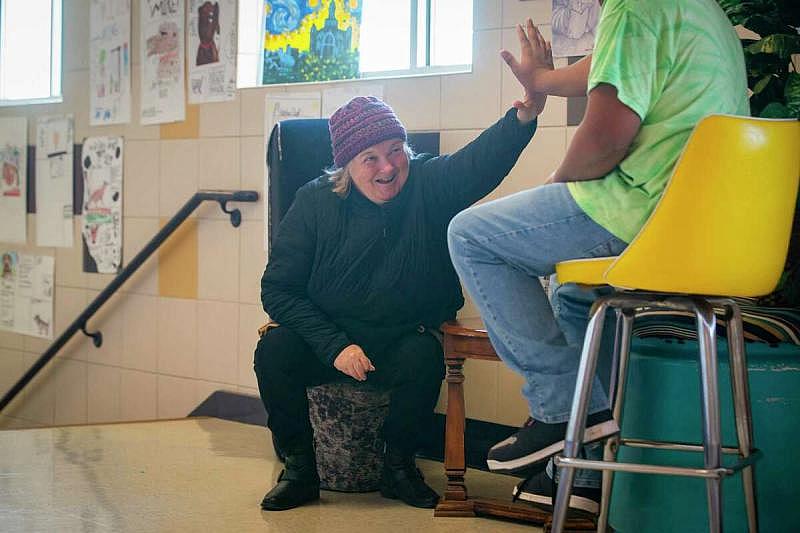
‘Dealer of hope’
Drive north from Dallas to Sanger and the houses get more spread out -- the fields of grazing cattle more frequent.
The city is home to two dozen churches but no grocery store.
It’s predominantly white. Predominantly Republican.
And only a fifth of residents have a bachelor’s degree.
It’s not exactly the place you’d expect to be on the cutting edge of mental health care for kids.
But Thomas Muir, Sanger’s mayor, said the close knit community is all about supporting its kids.
The city rallies around its athletes: Last year, Sanger was voted the best high school football fan base for its enrollment division in Texas. And it rallies around its students who are struggling.
“At the heart of it is a group of sincere, caring, compassionate people and they’re driven by an underlying belief system, most of them,” Muir said. “It’s just a good community.”
Then there’s Ann Hughes, a sturdy Irish woman who came to Sanger about 20 years ago to work for the Denton County Special Education Cooperative, a program that provides special education services and counseling to five school districts in the county. She eventually made her way to Sanger ISD, first as a high school principal at Linda Tutt and, three years ago, to the central office.
Hughes is a tough-talking, no-nonsense stalwart who doesn’t take no for an answer. She started out as a teacher but found that she connected most with kids who were mad or sad.
She’s worked in metropolitan schools in Yonkers, N.Y., in juvenile correction schools in Washington, D.C., and residential treatment centers for teens in upstate New York.
She’s seen it all and heard it all — the leprechaun insults stopped bothering her long ago.
Her father was a bookie in Ireland. He taught her to bet on the underdog to win big — a theme that’s carried throughout her life.
Those who work closely with her affectionately call her “a dealer of hope.”
Walking through the halls of Chisholm Trail Elementary or Linda Tutt High School, Hughes stops almost every child, asking how they’re doing — if they’ve been practicing the agreed upon calming skills or how they did at their sporting event.
Most teachers get a stop, too, as she hands out grant funding like Oprah hands out cars.
“I found some funding for ya,” she said to one.
“How’s my buddy today?” she asked another.
For Hughes, the state’s lack of requirements for mental health professionals and, therefore, its lack of dedicated funding for those positions aren’t an impenetrable wall but a track and field hurdle to sail over.
It just takes a little creativity.
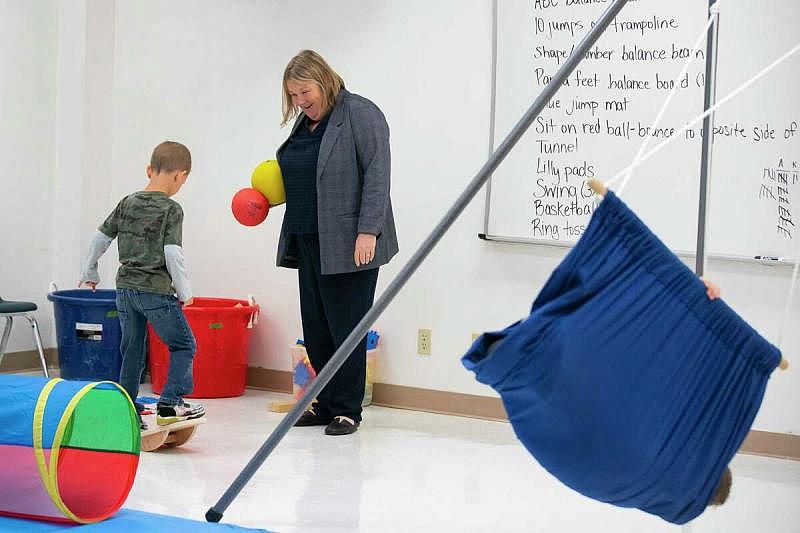
A space for kids
Sebastian, a second-grader, made a beeline for the hammock swing in Chisholm Trail Elementary’s Movement Room, diving into it so that his little body was completely engulfed by the blue fabric.
“I’m the crazy one!” he shouted, using his body weight to swing the chair back and forth like a pendulum.
On the other side of the room, another little boy was playing with blocks. Still another was jumping on a trampoline, while his friend stumbled along a foam balance beam.
The room was put in this school year to offer a space for kids who need to get their energy out in a nondisruptive way — those with anger issues or Attention Deficit Hyperactivity Disorder, for example.
The school also has a chill room, where kids with anxiety or Obsessive Compulsive Disorder, for example, can go to relax.
Some students, like Sebastian, have scheduled times throughout the day in these rooms when they can let loose and unwind. Others are signed in by their teachers on an as-needed basis.
Three school campuses at Sanger have dedicated rooms like these, paid for through a grant from Texas Health Resources, a faith-based, nonprofit health system in North Texas. In the past three years, Sanger has received nearly $600,000 through the THRIVE (Together Harnessing Resources to give Individuals Voice and Empowerment) grant to work with community partners on improving food insecurity — it opened a free grocery store run by students — and teaching resilience to kids who have experienced trauma.
Cari Cockrell, principal at Chisholm Trail Elementary School, laughs with a student in the chill zone in March. The room was put in last year with the help of grant money to give students a place to unwind and relax so that they have better classroom outcomes. Mark Mulligan, Houston Chronicle / Staff photographer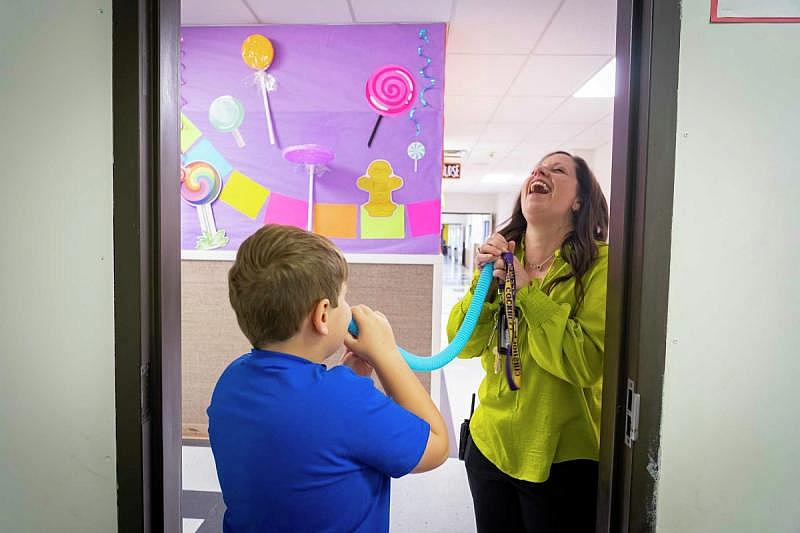
Along with these rooms, which initial data show are helping improve classroom outcomes, the grant allowed Sanger to secure access to two additional counselors for kids — one through a contract and the other through a partnership with First Refuge Ministries. The grant also funded implementation of a behavioral health screening for kids and multiple social and emotional learning software programs that teach children how to cope with bullying, anxiety and unplanned change, for example, as well as how to manage their feelings and understand empathy.
Through the grant, more than 2,100 students have been screened to determine if they need additional mental health or social and emotional supports and 224 were identified as needing intensive supports. About 500 students are regularly using the software programs and nearly 300 have received free counseling.
Without this grant, Sanger has similar struggles as other school districts. Though it met the nationally recommended ratio for psychologists between 2013 and 2021 — one per 500 students — it’s failed to meet the ratio recommended by the Texas Education Agency for counselors, which is one per 250 students. During that time period, they haven’t had a social worker on staff, even though experts recommend one per 250 students, and it has met the recommended ratio for school nurses — one per 750 students — in only five of the eight years examined by the Chronicle.
But the grant is one of the many ways Sanger ISD is making sure all its kids’ needs are being met.
And not everything costs money.
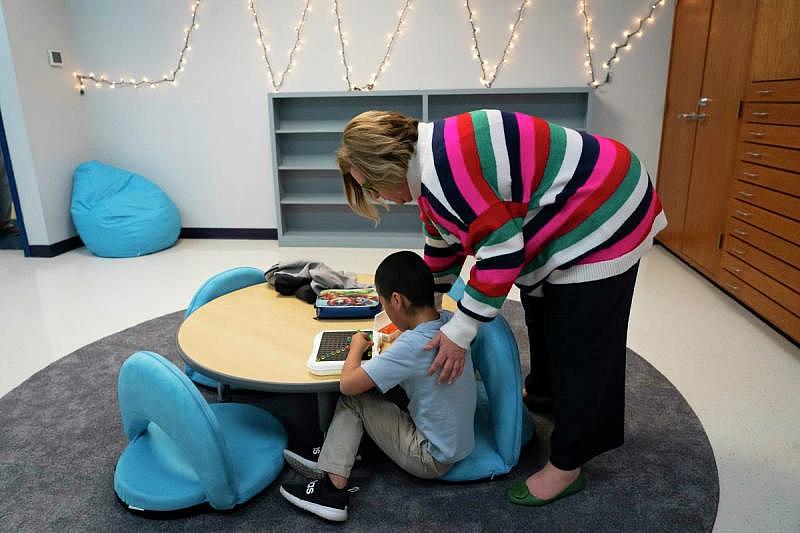
No ‘magic pill’
Preston Westbrook was in sixth grade at Linda Tutt Learning Center when he climbed on top of the building and threw trash and other debris at Hughes and the school resource officer.
At other schools, Preston might have been arrested.
But here, Hughes and the officer simply talked him off the roof. And then they let him cool down in an empty room.
Preston came to Linda Tutt an angry second-grader — angry at his absent father; anger at the world.
He had a tendency to climb things to deal with that anger: Christmas trees, school buildings, bleachers — you name it, he climbed it.
When something didn’t go his way, he pelted teachers and kids alike with a blue rubber racquetball.
But one of the things that makes Sanger ISD special is that they don’t punish kids for acting out. They try to understand the root of the behavior — and that doesn’t cost a penny.

“Behind every behavior, there’s a reason it’s there,” Hughes said. “We just have to figure out what it is to help them.”
Hughes taught Preston to punch an inanimate object instead of a person when he was blacked out with anger as an intermediary step.
He’s broken his wrist four times punching the concrete walls of Linda Tutt. But he doesn’t want to hit people anymore.
Instead, he uses music to calm down.
Now, Preston, 18, is a star student. He even manages Sanger ISD’s free grocery store.
He’s going to graduate on time this year and plans to study computer science at North Central Texas College.
Hughes has seen positive reinforcement work wonders in the district. In the Challenge Program, kids are given raffle tickets for good behavior, such as sitting quietly, waiting to be called on and being kind. At the end of class, they can trade their tickets in for prizes.
Students who perform well, be it academically or emotionally, get rewarded with Lunch Bunch, a lunch date with the school counselor. They’re invited to bring friends and usually just play games.
Apples to Apples is a favorite.
This format helps students feel comfortable with their counselor, Hughes said, and able to open up if something is bothering them.
Across all seven campuses, students can request break cards that they can place on their desk when they need to go to a designated area, be it the bathroom or the counselor’s office. This allows kids to step away from the class without drawing attention to themselves.
The school has group grief and anger counseling for kids, and one-on-one counseling also is available.
“We don’t have some magic pill,” said Ruby Henline, a counselor at the district’s sixth-grade campus. “This is something that can be duplicated.”
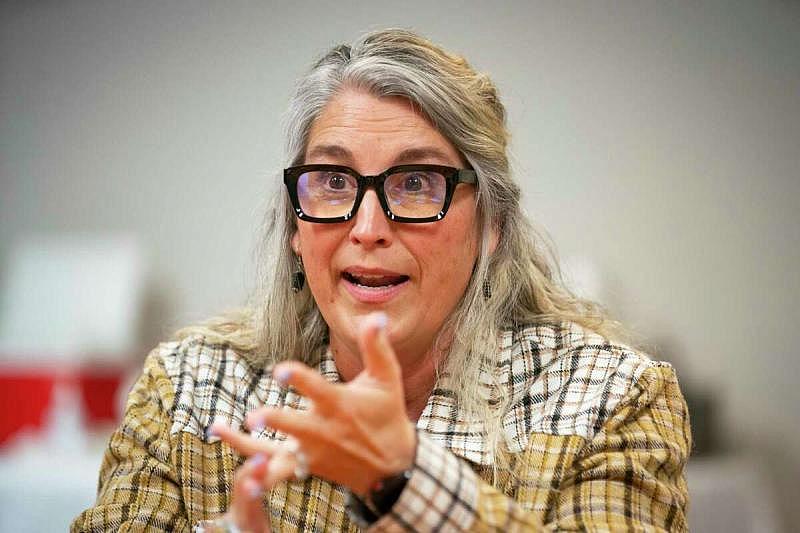
Flipping the switch
Commercial fridges line the wall, chock full of crisp heads of lettuce, prickly pineapples and shiny yellow squashes.
The aisles are packed with boxes of applesauce cups, jars of peanut butter and jelly and sealed plastic bowls of Cinnamon Toast Crunch just waiting to be drenched in cold milk.
A bitter chill rushes into Sanger ISD’s free grocery store. The kids and parents filling plastic bags with food pause for a moment to brace against the March wind.
The store is open every Tuesday night, and students volunteer to stock the shelves and overstuff bags, then cart them out to Sanger residents’ cars.
Sanger partnered with First Refuge Ministries to open the store. All the food is donated and, therefore, free to those in need, including students and their families.
And there’s a lot of need.
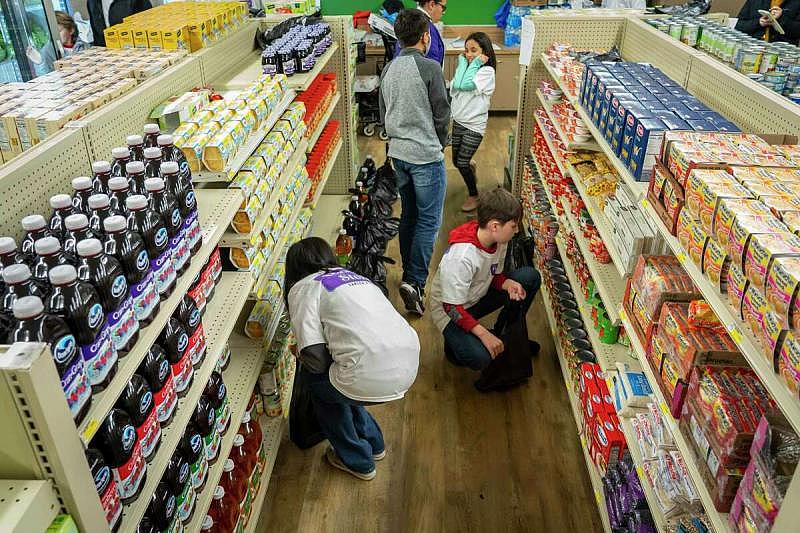
Last year, 41 percent of Sanger ISD students were eligible for free or reduced-price meals, according to data from the TEA.
The grocery store also gives the students a sense of purpose and mimics a real-world job, even down to the application process, which involves a résumé and two references.
This Tuesday is a big day: Today, they have pork loins.
Brogan Sorensen, 16, and his mom, Jennifer, work mostly outside, doling out bags of groceries.
Brogan, now a junior at Linda Tutt, has been working at the grocery store for about a year. He wanted to help families who were less fortunate, and his mom appreciated the life skills it provided.
It’s just one way that Linda Tutt has changed Brogan’s life.
“When Brogan came here to school it was literally life changing for me,” Jennifer said. “Being taken seriously … and (Sanger) listening to him is a huge, huge blessing.”
Brogan came to Linda Tutt in eighth grade after struggling in another school district for years. He had impulse control issues and acted out. He was diagnosed with ADHD, OCD and Disruptive Mood Dysregulation Disorder, a condition in which children exhibit extreme anger and irritability that requires clinical attention.
But there was minimal support for her son, she said, who needed a high level of supervision.
She felt like she was in a dark room — like she didn’t know the layout and she couldn’t find the light switch.
It got so bad that Jennifer pulled Brogan out of school and decided to home-school him for most of middle school.
But then she found Linda Tutt, where Brogan was given a one-on-one aide, which was gradually pulled back as he got older.
The aide helped spot signs that Brogan was getting overwhelmed, and urged him to take a walk or step away from the classroom so he didn’t have an outburst. Now, Brogan notices the signs himself.
He’s taking some of his classes at Linda Tutt, and the others at a larger school nearby. When he graduates, he plans to attend the Northwest Lineman College in Denton, where he can learn to work on power lines.
His mom, in turn, has become an advocate. She now works at the Denton County Mental Health and Mental Retardation Center, a local mental health authority that contracts with the Texas Health and Human Services Commission to provide services such as counseling, skills training and psychiatric evaluations to Texans.
Linda Tutt helped her turn on the light switch. And now she’s helping other families do the same.
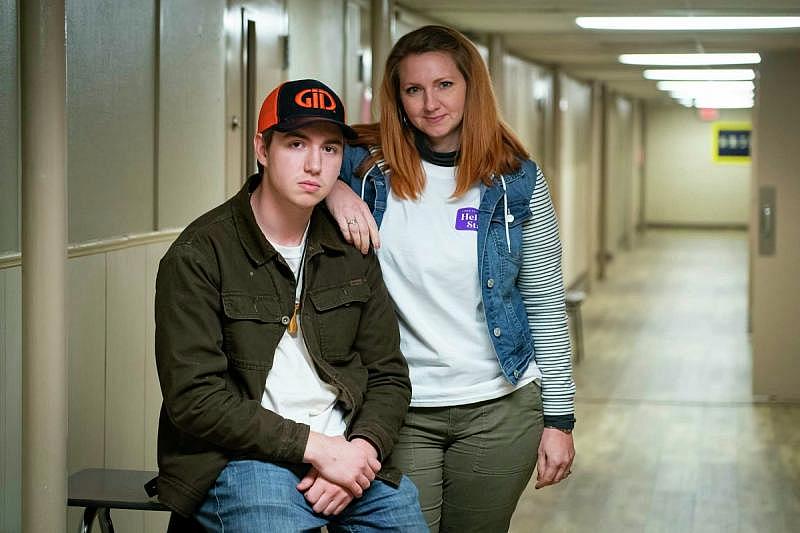
Winning ‘big’
Hughes paces the conference room in socked feet, greeting parents and kids with a smile and a warm hug.
Her boots had gotten dirty on a visit to the school’s 14-acre community garden, leased from New Life Church for $1 per year. The garden is a collaboration between the school, New Life Church and First Refuge Ministries as part of the THRIVE grant program.
Planting on the farm, where students will volunteer and learn agriculture skills, will begin this spring.
Instead of cleaning her boots in the sink, Hughes left them in the car. Now, she walks the halls in socks decorated with people doing yoga.
It’s a glimpse at Hughes’ true nature: She’s tough on the outside, but crack that exterior and you’ll find a silly, fun-loving woman who cares for these kids — kids who have been cast aside and deemed unreachable — more than anything.
“I bet on the outsider because when I win I want to win big,” she says.
It’s the success stories that get her emotional — that have kept her working in childhood mental health for 40 years. It’s men like Cody Braughler.
Braughler, now 32, hated school growing up. He was on track to drop out of high school, just like his father did decades prior.
He came to the Linda Tutt Learning Center and finally felt like people, especially Hughes, cared about him and wanted him to succeed.
Hughes’ tough facade fell — and the tears along with it — as Braughler and his dad, Jack, described exactly what Linda Tutt did for him and so many others.
“My son has a high school diploma. Not a GED, but a high school diploma,” Jack said.
“You saved my kid’s life.”
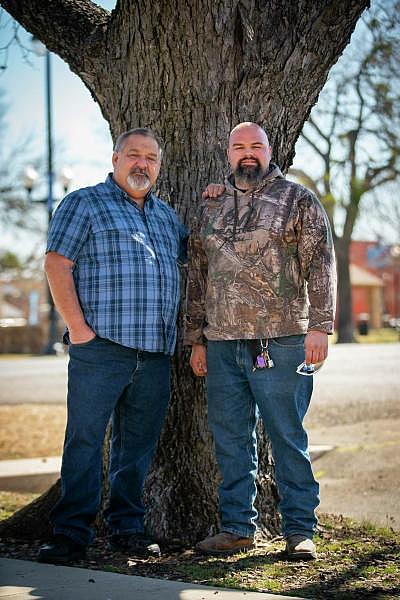
If you or someone you know is struggling with suicidal thoughts or depression you can call the Crisis of Intervention Houston Hotline at 832-416-1177.
Reporting
Alex Stuckey • alex.stuckey@chron.com • @alexdstuckey
Stephanie Lamm • stephanie.lamm@chron.com • @stephanierlamm
Visuals
Mark Mulligan • mark.mulligan@chron.com • @mrkmully
Editing
Mizanur Rahman • mizanur.rahman@chron.com • @Mizanur_TX
Copy editing
Charlie Crixell • charlie.crixell@chron.com • @ccrixell819
Design
Alexandra Kanik • alexandra.kanik@chron.com • @act_rational
Kirkland An • kirkland.an@chron.com • @kirkland_an
Ken Ellis • ken.ellis@chron.com • @kenduque
Jasmine Goldband • jasmine.goldband@chron.com • @fotojaz
Audience
Dana Burke • dana.burke@chron.com • @DanaPBurke
Jordan Ray-Hart • jordan.ray-hart@chron.com • @JordanLRay
Tommy Hamzik • tommy.hamzik@chron.com • @T_Hamzik
Laura Duclos • laura.duclos@chron.com • @LauraDuclosHC
John-Henry Perera • johnhenry.perera@chron.com • @pererajh
Data support
Christian McDonald • christian.mcdonald@utexas.edu • @crit
Executive Producer
Jennifer Chang • jennifer.chang@chron.com • @jenzchang
[This story was originally published by the Houston Chronicle.]


